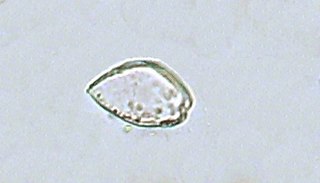
The Chlorophyceae are one of the classes of green algae, distinguished mainly on the basis of ultrastructural morphology. They are usually green due to the dominance of pigments chlorophyll a and chlorophyll b. The chloroplast may be discoid, plate-like, reticulate, cup-shaped, spiral or ribbon shaped in different species. Most of the members have one or more storage bodies called pyrenoids located in the chloroplast. Pyrenoids contain protein besides starch. Some green algae may store food in the form of oil droplets. They usually have a cell wall made up of an inner layer of cellulose and outer layer of pectose.

The Prorocentrales are a small order of dinoflagellates. They are distinguished by having their two flagella inserted apically, rather than ventrally as in other groups. One flagellum extends forward and the other circles its base, and there are no flagellar grooves. This arrangement is called desmokont, in contrast to the dinokont arrangement found in other groups. Accordingly, the Prorocentrales may be called desmoflagellates, and in some classifications were treated as a separate class Desmophyceae.

The glaucophytes, also known as glaucocystophytes or glaucocystids, are a small group of unicellular algae found in freshwater and moist terrestrial environments, less common today than they were during the Proterozoic. The stated number of species in the group varies from about 14 to 26. Together with the red algae (Rhodophyta) and the green algae plus land plants, they form the Archaeplastida. However, the relationships among the red algae, green algae and glaucophytes are unclear, in large part due to limited study of the glaucophytes.

AlgaeBase is a global species database of information on all groups of algae, both marine and freshwater, as well as sea-grass.
Chlorokybus is a multicellular (sarcinoid) genus of basal green algae or charophyte, a soil alga. It has been classified as the sole member of the family Chlorokybaceae, which is the sole member of the order Chlorokybales, in turn the sole member of the class Chlorokybophyceae.
Mesostigma is a genus of freshwater green algae, with a single species Mesostigma viride. As of February 2022, AlgaeBase classified it as the only genus in the family Mesostigmataceae, the only family in the order Mesostigmatales, the only order in the class Mesostigmatophyceae. It is now considered to be one of the earliest diverging members of green plants/algae (Viridiplantae).

The Rivulariaceae are a family of cyanobacteria within the Nostocales in which the filaments (trichomes) are tapered from wider at the base to narrower at the tip.
Pyrenomonas is a genus of cryptomonad.

Oxyrrhis is a genus of dinoflagellates. It includes the species Oxyrrhis marina.

Erythrotrichia is a red algae genus in the family Erythrotrichiaceae. In Iceland, E. carnea is red listed as a vulnerable species (VU).
Perkinsidae is a family of alveolates in the phylum Perkinsozoa, a sister group to the dinoflagellates.

Syracosphaera azureaplaneta is a species of coccolithophore. This oceanic phytoplankton is not common, but is widely distributed and is known to occur in all the major seas, from tropical to sub-arctic regions. It is named after the BBC TV documentary series, The Blue Planet.

Syracosphaerales is an order of algae consisting of three families:
Syracosphaeraceae is a family of algae consisting of the following genera:








